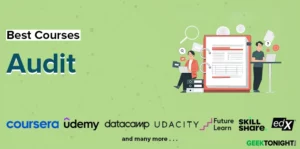Fraud is a deceptive and unlawful practice that involves deliberate misrepresentation or deception to gain an unfair advantage or financial benefit. It encompasses a wide range of activities, from financial fraud and identity theft to internet scams and Ponzi schemes. In the ensuing discourse, we will delve into the intricacies of fraud and explore a selection of the best fraud courses tailored to equip individuals and professionals with the requisite knowledge and skills to effectively combat this pervasive threat.
Importance of Fraud
The significance of fraud cannot be understated, as it remains a pressing concern in modern society. In 2022, the Consumer Sentinel Network registered 2.4 million reports of fraud, indicating a slight decline from the 2.9 million reports in 2021. However, what is particularly noteworthy is the substantial increase in total reported losses, which surged to nearly $8.8 billion in 2022, surpassing the previous year’s figure of $6.1 billion.
This alarming escalation in financial losses underscores the pervasive and enduring impact of fraud on individuals and businesses alike, emphasizing the critical need for heightened vigilance, prevention, and mitigation efforts in the ongoing battle against fraudulent activities.
Table of Content
- 1 Importance of Fraud
- 2 Best Fraud Courses, Certification, Tutorials, Training, Classes Online
- 2.1 Forensic Accounting and Fraud Examination [Coursera]
- 2.2 Forensic Accounting: Fraud Investigation! (Course 1 of 4) [Udemy]
- 2.3 Forensic Accounting: Fraud Investigation! (Course 2 of 4) [Udemy]
- 2.4 Corporate Internal Controls and Fraud Controls [Udemy]
- 2.5 Fraud Investigation: Making a Difference [Futurelearn]
- 2.6 Fraud Detection in Python [Datacamp]
- 3 FAQ
Our product recommendations are unbiased and based on an independent review process. We may receive a commission for links to recommended partners. See our advertiser disclosure for more information.
Best Fraud Courses, Certification, Tutorials, Training, Classes Online
Forensic Accounting and Fraud Examination [Coursera]
The Fraud course online is a comprehensive program designed to equip learners with essential skills in accounting, audit, data analysis, and finance, all with a strong focus on combating fraud.
Course Instructor
The Fraud training is instructed by three accomplished experts from West Virginia University: Dr. Richard Riley, PhD, Dr Richard Dull, PhD, and John Gill, J.D., CFE. Their combined expertise ensures that learners receive in-depth knowledge and practical insights in forensic accounting and fraud examination.
What you’ll learn
The course includes the following 5 modules
- The Accidental Fraudster: The course on “The Accidental Fraudster” delves into the concept of individuals who unintentionally engage in fraudulent activities.
- The Predator Fraudster: In the course titled “The Predator Fraudster,” participants gain valuable knowledge about individuals who intentionally commit fraudulent acts.
- Big Data, Benford’s Law, and Financial Analytics: “Big Data, Benford’s Law, and Financial Analytics” provides an in-depth understanding of big data, its analysis, and the application of statistical tools like Benford’s Law in fraud detection.
- Cyber-Crime and Money Laundering: Contemporary Tools and Techniques: This course delves into the complex realm of cybercrime and money laundering, focusing on contemporary tools and techniques used in combating financial crimes.
- Whistleblowing: “Whistleblowing” is an educational resource that sheds light on the importance of whistleblowing in promoting transparency and ethical conduct within organizations.
Pros & Cons
Pros
- Diverse Instructor Expertise
- Real-World Case Studies
Cons
- Time Commitment
- Limited Interactivity
Key Highlights & Learning Objectives
- Given the increasing importance of fraud detection and prevention in today’s business landscape, this course offers timely and relevant knowledge for professionals across various industries.
- The course benefits from a diverse set of instructors, each bringing their unique perspective and experience to the subject, enriching the learning experience.
- This course comprises five modules with videos, articles, and other resources to facilitate learning, along with a certificate of completion.
Who is it for?
This online fraud course is ideally suited for individuals looking to enhance their expertise in forensic accounting and fraud examination, making it a valuable choice for professionals in accounting, auditing, finance, or those responsible for safeguarding organizations against fraud.
Rating: 4.7/5
Students Enrolled: 163,025
Duration: 3 weeks, 2 hours/week
Forensic Accounting: Fraud Investigation! (Course 1 of 4) [Udemy]
Explore the intricate world of forensic accounting and fraud investigation in this extensive online fraud course. Delve into the legal definition of fraud and uncover the essential elements of the ‘fraud triangle’—opportunity, pressure, and rationalization.
Course Instructor
The fraud training is led by Stefan Ignatovski, Ph.D., an award-winning professor and entrepreneur renowned for his expertise in accounting forensics, bringing a unique and engaging teaching approach to the subject.
Pros & Cons
Pros
- Real-Life Problem-Solving
- Holistic Knowledge
Cons
- Limited Depth
Key Highlights & Learning Objectives
- Bite-sized video lectures, each under 5 minutes, ensure an engaging and fun learning experience.
- Gain a deep understanding of the three critical elements – opportunity, pressure, and rationalization – that form the basis of fraud investigation.
- Explore a variety of fraudulent activities, from sales skimming to billing schemes, equipping you to detect and prevent financial misconduct.
- This course comprises 29 video lectures, one informative article, one downloadable resource, and provides a Certificate of Completion.
Who is it for?
This fraud course online is ideally suited for individuals seeking a foundational understanding of forensic accounting and fraud investigation. It caters to business professionals, accountants, auditors, and anyone with an interest in uncovering financial misdeeds.
Rating: 4.4/5
Students Enrolled: 26,349
Duration: 2 hours
Forensic Accounting: Fraud Investigation! (Course 2 of 4) [Udemy]
This online fraud course is the second installment in a series of four, focusing on fraud examination, prevention, detection, and correction. It provides a comprehensive understanding of various aspects of fraud, including check tampering, payroll frauds, expense reimbursement frauds, and register disbursement frauds.
Course Instructor
Instructor Stefan Ignatovski, Ph.D., an award-winning professor, investor, and entrepreneur, brings his expertise in Accounting Forensics to this online fraud class, offering engaging, bite-sized video lectures that make learning about fraud examination a memorable experience.
Pros & Cons
Pros
- Certification Path
- Insightful Resources
Cons
- Length of Videos
- Course Dependence
Key Highlights & Learning Objectives
- The course breaks down complex topics into bite-sized video lectures, each lasting no longer than 5 minutes, making it easy to grasp intricate concepts.
- Ideal for those pursuing the Certified Fraud Examiner (CFE) certification, this course equips you with the knowledge needed for success in the field.
- This course comprises 26 video lectures, interactive quizzes for each lecture, real-life case studies for practical application, and provides a Certificate of Completion.
Who is it for?
This fraud online course is ideally suited for individuals seeking a comprehensive introduction to fraud examination, including professionals such as accountants, auditors, and CPAs, as well as business owners and managers interested in safeguarding their organizations.
Rating: 4.6/5
Students Enrolled: 1537
Duration: 2 hours
Corporate Internal Controls and Fraud Controls [Udemy]
In the course extensive fraud course online participants are provided with a comprehensive understanding of the critical elements that underpin financial integrity in corporate settings. This delves into the world of corporate internal controls, covering manual and electronic control mechanisms, compliance with financial regulations, and strategies to safeguard against fraud risks.
Course Instructor
The fraud training is instructed by Blair Cook, a seasoned financial executive and corporate director with extensive experience in finance, accounting, and professional development services, along with the team at Illumeo Learning, experts in delivering efficient courses for professionals across various industries.
Pros & Cons
Pros
- COSO framework
- Industry Benchmark
Cons
- Focus on Basic Concepts
- Limited Real-World Simulations
Key Highlights & Learning Objectives
- With a strong emphasis on ethical reporting and compliance with laws and regulations, the course underscores the importance of maintaining transparency and accountability.
- The course takes a holistic approach, covering the COSO framework, working papers, the fraud triangle, common fraud schemes, and more.
- The course equips participants with the knowledge and tools needed to assess control risk effectively, helping organizations proactively manage financial risks.
- Through compliance testing, substantive testing, and documentation reviews, participants acquire the skills necessary to conduct robust assessments of control mechanisms.
- This course comprises three sections with a total of 11 video lectures, accompanied by one informative article, one downloadable resource, and a certificate of achievement.
Who is it for?
This online fraud course is best suited for individuals interested in finance, accounting, or related fields who seek a comprehensive understanding of corporate internal controls and fraud controls. It’s particularly valuable for those looking to strengthen their knowledge of fundamental concepts in financial integrity and fraud prevention.
Rating: 4/5
Students Enrolled: 21,188
Duration: 1 hours
Fraud Investigation: Making a Difference [Futurelearn]
The FutureLearn Fraud Investigation is a comprehensive course designed to empower individuals with the knowledge and skills necessary to combat fraud effectively. This course delves into the most common types of fraud in the UK and explores the underlying factors and theories driving fraudulent activities.
Course Instructor
The fraud training features a team of accomplished experts including Ian Sales, a 25-year veteran of the City of London Police with extensive experience in Economic Crime, and Dr. Rasha Kassem, a Senior Lecturer at Coventry University and Certified Fraud Examiner.
Pros & Cons
Pros
- Collaboration with Industry
- Multi-Faceted Approach
Cons
- Time Commitment
- Assessment required
Key Highlights & Learning Objectives
- Explore the Fraud Investigation Model (FIM), providing a systematic and effective method for conducting fraud investigations.
- Engage in discussions and share ideas with a global community of learners, enhancing your understanding and networking opportunities.
- The course covers a range of fraud types, from identity theft to investment scams, ensuring a comprehensive understanding of the diverse nature of fraudulent activities.
- The course comprises a total of 15 videos, 10 articles, and 5 practical resources, along with the certificate of completion.
Who is it for?
This fraud course online is best suited for individuals who are interested in proactively protecting themselves and others against fraud in the UK and beyond. It’s an ideal choice for those looking to gain a comprehensive understanding of common fraud types, the factors driving fraud, and practical skills in fraud investigation.
Rating: 4.5/5
Students Enrolled: 35,674
Duration: 2 weeks, 2 hours/week
Fraud Detection in Python [Datacamp]
Discover the art of Fraud Detection in Python through this extensive DataCamp fraud course. The course equips you with practical skills to combat fraud. It covers everything from tackling imbalanced datasets to using supervised and unsupervised learning techniques for fraud detection.
Course Instructor
Dr. Charlotte Werger, the esteemed Director of Advanced Analytics at Nike, serves as the instructor of this fraud training, bringing a wealth of experience in applying data science to various domains, including fraud detection. Collaborators Hadrien Lacroix and Mari Nazary contribute their expertise to enhance the course content further.
Pros & Cons
Pros
- Customized Solutions
Cons
- Lack of Written Articles
- Prerequisite Knowledge
Key Highlights & Learning Objectives
- This course empowers participants with the skills to combat fraud effectively by leveraging data-driven techniques, addressing a crucial challenge for organizations.
- The course covers both supervised and unsupervised learning techniques, enabling learners to tackle both known and emerging fraudulent patterns.
- Participants gain valuable insights into handling imbalanced datasets, a common issue in fraud detection.
- The course encompasses 16 videos, various additional resources, and provides a certificate of completion upon successfully finishing the course.
Who is it for?
This Python fraud tutorial is best suited for data scientists, analysts, and professionals in the fields of finance, cybersecurity, and fraud prevention, who are determined to strengthen their capabilities in fraud detection using Python.
Rating: 4.7/5
Students Enrolled: 36,139
Duration: 4 hours
FAQ
How can I learn fraud?
Learning about fraud involves understanding various aspects of fraudulent activities, detection methods, and prevention strategies. Here are steps you can take to learn about fraud:
Education and Courses:
Enroll in courses or programs that focus on forensic accounting, fraud examination, or white-collar crime. Many universities offer specialized courses in these areas.
Certifications:
Consider obtaining certifications such as Certified Fraud Examiner (CFE), which provides in-depth knowledge about fraud detection, deterrence, and investigation techniques.
Read Literature and Resources:
Study books, journals, articles, and publications focusing on fraud examination, forensic accounting, and criminology to understand different fraud schemes and case studies.
Online Resources and Webinars:
Take advantage of online resources, webinars, and podcasts related to fraud examination and prevention. Many organizations and institutions offer free or paid content on fraud-related topics.
Internships or Work Experience:
Seek internships or work opportunities in accounting firms, law enforcement agencies, or corporate investigation departments to gain practical exposure to fraud detection and investigation techniques.
Networking:
Connect with professionals working in the field of forensic accounting, fraud examination, or law enforcement. Networking can provide insights, mentorship, and potential opportunities to learn more about fraud-related practices.
Case Studies and Practical Applications:
Study real-life fraud cases and understand the methods used to perpetrate, detect, and prevent fraud. Analyzing actual cases provides practical insights into fraud schemes and their detection.
Continuous Learning:
Stay updated with the latest fraud trends, tools, and techniques. Fraudsters constantly evolve their methods, and staying informed is crucial to combat new fraudulent schemes.
Remember that understanding fraud involves a combination of theoretical knowledge, practical experience, and staying updated with the latest developments in the field. Ethical considerations are also vital in studying fraud, as this knowledge can be used to prevent, detect, and investigate fraudulent activities rather than engage in them.
What is the qualification of a fraud officer?
Qualifications for a fraud officer can vary based on the specific requirements of the employing organization or industry. However, the role often demands a combination of education, relevant experience, specific skills, and certifications. Here are the typical qualifications sought in a fraud officer:
Education:
A bachelor’s degree in a relevant field such as accounting, finance, business administration, criminal justice, or a related discipline is often required. Some positions might prefer or require an advanced degree, like a Master’s in Business Administration (MBA) or a Master’s in Accounting.
Experience:
Relevant work experience in areas like fraud investigation, forensic accounting, auditing, law enforcement, or financial analysis is highly beneficial. Prior experience in a related field enhances the understanding of fraudulent activities and their detection.
Skills and Abilities:
Analytical Skills: Ability to analyze financial data, identify irregularities, and spot anomalies.
Investigative Skills: Strong investigative abilities to research, interview, and gather evidence in cases of suspected fraud.
Communication Skills: Proficient in written and verbal communication for report writing, presenting findings, and interacting with various stakeholders.
Knowledge of Laws and Regulations: Understanding of relevant laws, regulations, and compliance standards related to fraud and financial crimes.
Certifications:
Certified Fraud Examiner (CFE): This certification is highly regarded and demonstrates expertise in fraud prevention, detection, and investigation.
Association of Certified Fraud Examiners (ACFE): Other certifications provided by ACFE can also be beneficial, such as Certified Fraud Specialist (CFS) or Certified Anti-Money Laundering Specialist (CAMS).
Continuing Education:
Keeping up to date with new fraud schemes, tools, and techniques through continuous education and professional development is crucial for a fraud officer.
Ethical Standards:
Understanding and adherence to ethical standards is paramount in this role due to the sensitive and often confidential nature of investigations.
Having a combination of formal education, relevant experience, certifications, and the necessary skills and abilities is essential for someone aspiring to work as a fraud officer. Additionally, the specifics of the qualifications can vary based on the industry, the scope of the role, and the particular requirements of the hiring organization.
Is Fraud Risk a Good Career?
A career in fraud risk management can be both challenging and rewarding, offering several opportunities for those interested in this field. Here are some aspects to consider when evaluating it as a career:
Growing Demand: With the increase in financial crimes and fraudulent activities across various industries, there’s a growing demand for professionals specialized in fraud risk management. Companies, financial institutions, and government agencies are actively seeking individuals who can identify, prevent, and mitigate fraud risks.
Diverse Opportunities: A career in fraud risk management offers diverse opportunities in various sectors, including finance, banking, insurance, healthcare, retail, technology, and government. Professionals can work as fraud analysts, risk managers, investigators, compliance officers, or consultants.
Continuous Learning: Fraud is an evolving field, and professionals need to continuously update their skills to keep pace with the changing tactics of fraudsters. This necessitates ongoing learning and development, which can be intellectually stimulating.
Impactful Work: Working in fraud risk allows individuals to make a substantial impact by protecting organizations and individuals from financial losses, preserving their assets, and maintaining trust in the integrity of financial systems.
Challenges and Problem-Solving: The nature of fraud risk management involves identifying complex problems, conducting investigations, and implementing solutions to mitigate risks. This can be intellectually challenging and rewarding.
Job Security and Competitive Salaries: Due to the increasing need for fraud prevention measures, professionals in this field often enjoy job security and competitive salaries.
However, there are also some challenges to consider:
High Responsibility: Managing fraud risk comes with a high level of responsibility, as professionals are tasked with safeguarding an organization’s assets and reputation.
High-Stress Situations: Investigating fraud and dealing with fraudulent activities can be stressful, particularly when dealing with legal and ethical implications.
Continuous Learning and Evolving Skills: Staying current with the ever-evolving landscape of fraud schemes requires ongoing education and development.
Deciding whether a career in fraud risk is a good fit depends on an individual’s interests, skills, and willingness to continuously learn and adapt in a constantly changing environment. For those passionate about preventing financial crimes and possess analytical and problem-solving skills, a career in fraud risk management can be fulfilling and rewarding.









